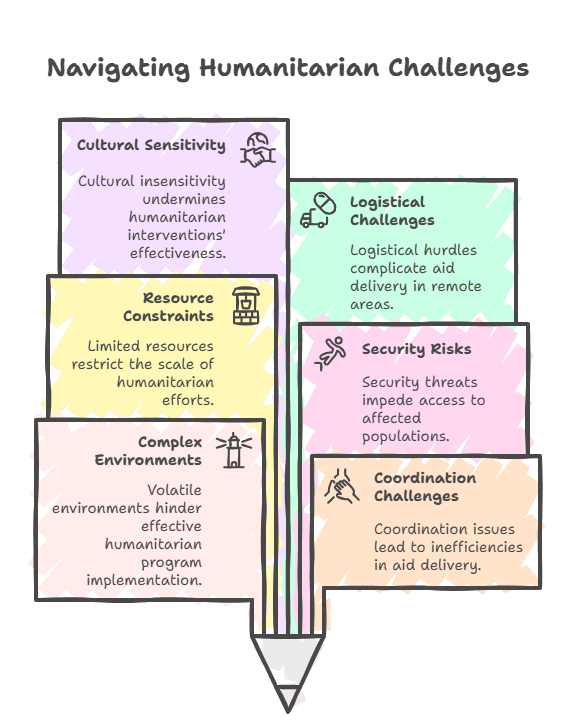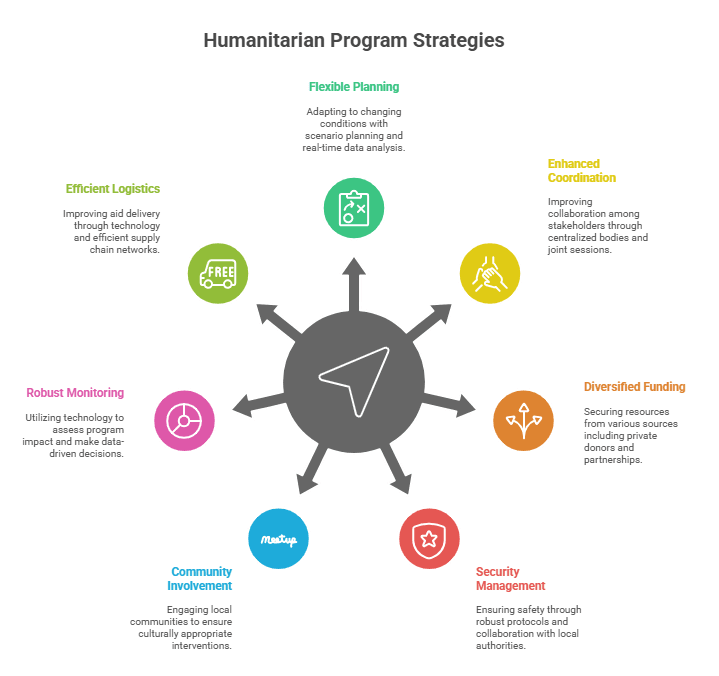Humanitarian program management is a critical field aimed at providing relief and support to populations affected by crises such as natural disasters, armed conflicts, and health emergencies. Effective management of these programs is essential to ensure that aid reaches those in need efficiently and equitably. However, the complexity of humanitarian crises presents numerous challenges. This essay explores the key challenges in humanitarian program management and proposes measures to mitigate these challenges.
Challenges in Humanitarian Program Management:
- Complex and Dynamic Environments: Humanitarian crises often occur in volatile and unpredictable environments. Natural disasters, conflicts, and epidemics can rapidly change the context in which aid is delivered, making it difficult to plan and implement programs effectively.
- Coordination and Collaboration: Multiple organizations, including governments, non-governmental organizations (NGOs), and international agencies, are often involved in humanitarian responses. Ensuring effective coordination and collaboration among these entities is challenging, leading to potential overlaps, gaps, and inefficiencies in aid delivery.
- Resource Constraints: Humanitarian programs frequently face limitations in funding, supplies, and human resources. These constraints can hamper the scale and scope of relief efforts, making it difficult to address all needs comprehensively.

- Security Risks: In conflict zones and unstable regions, security risks for humanitarian workers are significant. Threats such as armed attacks, kidnappings, and harassment can impede access to affected populations and disrupt program implementation.
- Cultural Sensitivity and Community Engagement: Humanitarian aid must be culturally appropriate and accepted by the local population. Failure to understand and respect local customs, traditions, and power dynamics can lead to resistance and mistrust, undermining the effectiveness of interventions.
- Monitoring and Evaluation: Assessing the impact and effectiveness of humanitarian programs is challenging due to the urgent and chaotic nature of crises. Lack of reliable data, rapidly changing conditions, and limited access to affected areas can complicate monitoring and evaluation efforts.
- Logistical Challenges: Delivering aid to remote or inaccessible areas, managing supply chains, and ensuring the timely distribution of resources are significant logistical challenges. Poor infrastructure, damaged roads, and bureaucratic hurdles can further complicate logistics.
Mitigation Measures
- Flexible and Adaptive Planning: Humanitarian programs should incorporate flexible and adaptive planning mechanisms to respond to changing conditions. Scenario planning, contingency plans, and real-time data analysis can help managers adjust strategies quickly and effectively.
- Enhanced Coordination Mechanisms: Strengthening coordination mechanisms among various stakeholders is essential. Establishing centralized coordination bodies, joint planning sessions, and information-sharing platforms can improve collaboration and reduce duplication of efforts.
- Diversified Funding Sources: To address resource constraints, humanitarian organizations should diversify their funding sources. This includes engaging with private donors, international agencies, and developing partnerships with the private sector to mobilize additional resources.

- Security Management and Training: Implementing robust security management protocols and providing comprehensive training for humanitarian workers can mitigate security risks. Collaboration with local authorities and communities to ensure safe access routes and secure working environments is also crucial.
- Community Involvement and Cultural Sensitivity: Engaging local communities in the planning and implementation of humanitarian programs ensures that interventions are culturally appropriate and accepted. Participatory approaches, community consultations, and employing local staff can enhance the effectiveness of aid delivery.
- Robust Monitoring and Evaluation Systems: Developing robust monitoring and evaluation systems that utilize technology, such as remote sensing and mobile data collection, can improve the assessment of program impact. Establishing clear indicators and regularly reviewing program performance can help in making data-driven decisions.
- Efficient Logistics Management: Improving logistics management through the use of technology, pre-positioning of supplies, and establishing efficient supply chain networks is critical. Collaboration with logistics experts and leveraging local infrastructure can enhance the delivery of aid.
Conclusion
Humanitarian program management is fraught with challenges that require innovative and adaptive approaches. By understanding and addressing the complexities of the operating environment, enhancing coordination, securing adequate resources, and engaging with local communities, humanitarian organizations can improve the effectiveness and efficiency of their programs. Continuous learning, flexibility, and a commitment to cultural sensitivity are essential for overcoming the challenges in humanitarian program management and ensuring that aid reaches those in need in a timely and effective manner.
In humanitarian work, our greatest asset is not our resources, but our ability to mobilize and manage them effectively in the face of adversity
- Tags:

